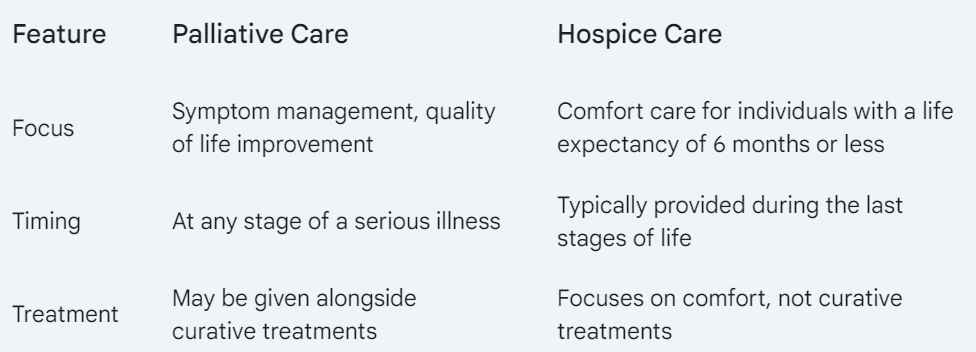Role of Family in Hospice Care: Navigating the Journey Together
When a loved one is facing a serious or terminal illness, families often find themselves in an unfamiliar and emotionally overwhelming situation. Hospice and palliative care services provide essential medical, emotional, and spiritual support during this time, but the role of family in hospice care is just as crucial.
In Houston, Texas, families play an active role in hospice and palliative care houston Texas, ensuring their loved ones receive the best possible comfort and dignity. Whether in inpatient hospice facilities in Houston or at home, family members become caregivers, decision-makers, and emotional pillars for their loved ones.
This blog explores the importance of family involvement in hospice care, how they can support their loved ones, and the resources available in Houston, Texas to help families navigate this difficult journey.
Understanding Hospice and Palliative Care
Hospice and palliative care both focus on improving the quality of life for people with serious illnesses, but they have key differences:
- Palliative care is available at any stage of a serious illness and can be provided alongside curative treatments. It aims to relieve symptoms, pain, and emotional distress.
- Hospice care is designed for patients with terminal illnesses, usually with a life expectancy of six months or less. It focuses entirely on comfort rather than curative treatments.
In Houston, Texas, palliative care services are available in hospitals, outpatient clinics, and even at home, while inpatient hospice facilities provide 24/7 care for those who need more intensive medical support.
The Family’s Role in Hospice Care
When a loved one enters hospice care, the family becomes an essential part of the care team. Their involvement ensures that the patient receives not just medical attention but also emotional and spiritual support. Here’s how families contribute:
1. Providing Emotional Support
One of the most important roles of family members is offering emotional support. Facing the end of life is difficult for both the patient and their loved ones. Simple gestures like holding hands, listening, and reminiscing about happy memories can bring comfort and reassurance.
Hospice teams often include counselors and chaplains who can help families process emotions, but nothing replaces the warmth of a familiar voice or a loved one’s presence.
2. Assisting with Daily Care
For patients receiving hospice care at home, family members often take on the role of caregivers. This may include:
- Helping with personal hygiene and grooming.
- Administering medications as prescribed by the hospice team.
- Assisting with feeding and mobility.
- Monitoring symptoms and communicating with healthcare providers.
For families unable to provide full-time care, inpatient hospice facilities in Houston offer around-the-clock medical support while still allowing family involvement.
3. Making Medical and End-of-Life Decisions
When a patient can no longer make decisions on their own, family members may need to step in and advocate for their loved one’s wishes. This includes:
- Deciding on pain management and comfort measures.
- Discussing preferences for care settings (home vs. inpatient hospice).
- Understanding and honoring advance directives or living wills.
Having these discussions early can prevent confusion and ensure the patient’s wishes are respected.
4. Supporting Each Other as a Family
Caring for a loved one in hospice can be physically and emotionally draining. Family members need to support each other by sharing caregiving responsibilities, encouraging open conversations, and seeking professional counseling if needed.
Many hospice programs in Houston, Texas offer family support groups, grief counseling, and respite care to give caregivers a break while ensuring their loved one continues to receive proper care.
The Role of Hospice Professionals in Supporting Families
While families play a key role in hospice care, they are not alone. Hospice teams provide expert medical care, emotional support, and guidance. In Houston’s inpatient hospice facilities, patients and families receive:
- 24/7 medical care to manage pain and symptoms.
- Social work services to help families navigate financial and legal matters.
- Counseling and spiritual care to address emotional and religious concerns.
- Bereavement support to help families cope with loss.
These services ensure that families are well-supported throughout the hospice journey.
How Families Can Prepare for Hospice Care
Hospice care can be a challenging transition, but early preparation can help families feel more in control. Here are some steps to take:
1. Educate Yourself About Hospice Services
Understanding what hospice care involves can reduce fear and uncertainty. Families should learn about available services, insurance coverage, and care options in their area.
2. Have Open Conversations with Your Loved One
It’s important to discuss end-of-life wishes, even if the conversation is difficult. Topics to address include:
- Where they want to receive care (home, inpatient hospice, or nursing facility).
- Preferences for pain management and comfort measures.
- Emotional and spiritual needs.
3. Build a Support Network
Caring for a terminally ill loved one is not a journey anyone should take alone. Families should reach out to friends, hospice teams, and local support groups in Houston, Texas for help.
4. Take Care of Your Own Well-Being
Hospice caregivers often neglect their own health. It’s important for family members to:
- Get enough rest and nutrition.
- Take short breaks with respite care services.
- Seek counseling or emotional support when needed.
Resources for Families in Houston, Texas
Houston has many hospice and palliative care providers that offer comprehensive support for both patients and families. Some key resources include:
- Inpatient hospice facilities in Houston: These centers provide full-time medical and comfort care for patients who require intensive symptom management.
- Palliative care services in Houston, Texas: Available for patients who need symptom relief and emotional support at any stage of their illness.
- Support groups and counseling: Many hospice organizations offer bereavement support and caregiver counseling to help families cope.
- Respite care: Short-term care services allow family caregivers to take a break while ensuring their loved one is cared for.
Families can speak with a healthcare provider to find the best hospice or palliative care options in their area.
Final Thoughts
Hospice care is not just about the patient—it’s a journey that the entire family takes together. Family members provide love, comfort, and advocacy for their loved ones while receiving essential support from hospice professionals.
In Houston, Texas, families have access to excellent palliative care and inpatient hospice Houston facilities, ensuring their loved ones receive compassionate, high-quality care. By working together and utilizing available resources, families can navigate the hospice journey with dignity, strength, and peace.
If you or a loved one is considering hospice care, reach out to a trusted hospice provider in Houston to explore the best care options available.








